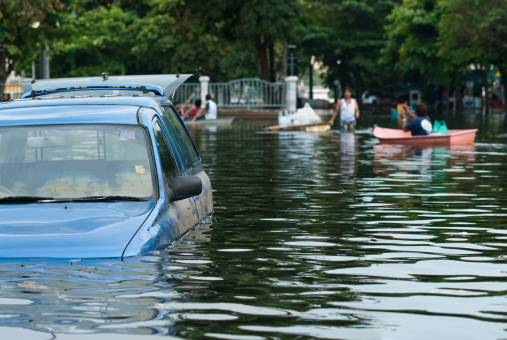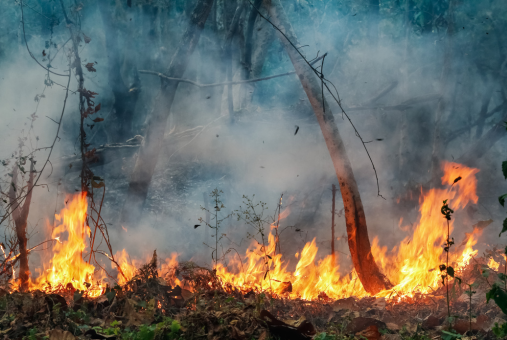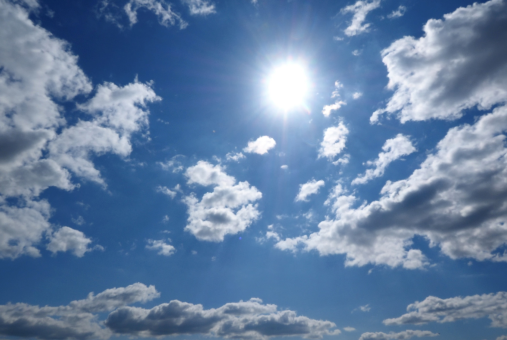Journalists covering climate change in Latin America face a dual challenge: they share the same fears as everyone else about the climate crisis, but they’re also in the unique position of reporting on the frontlines of environmental devastation in a region affected by structural inequalities.
This is according to Diego Arguedas Ortiz, associate director of the Oxford Climate Journalism Network, a program of the Reuters Institute for the Study of Journalism at the University of Oxford. He said that since 2022, the network has collaborated with 700 editors and reporters, and every semester he hears similar stories of professionals facing emotional distress due to the stories they cover.
“In the unequal societies of Latin America, the reporters covering climate change face the emotional distress of talking with families that lost everything in a storm or a flood,” Arguedas Ortiz told LatAm Journalism Review (LJR). “And we are tasked with telling their stories to the world. That takes a toll.”
For many years, there was no concrete evidence of this emotional distress, but a new study from the University of Toronto, supported by the Oxford Climate Journalism Network, will provide robust data on the topic. The study, which analyzed a global sample of 268 climate journalists from 90 countries, reveals that 60% of those interviewed experience symptoms of psychological stress. At the same time, 63% reported that mental health is not taken seriously by their newsrooms, and 55% said they do not have access to resources to support their mental and physical health.
The study – with preliminary results now available – was led by Dr. Anthony Feinstein, a researcher known for his work on the impact of conflict reporting on mental health and author of "Journalists Under Fire: The Psychological Hazards of Covering War," in partnership with researcher Jillian Mead.
“We talk to people who have lost everything to extreme weather, or are frustrated because their science is not listened to and we challenge decision makers who fail to take action to protect others. And then we have to go on TV or radio or written media to share this pain and frustration and ideas, which is an emotionally charged job,” Arguedas Ortiz said. “And it starts again the next week and month. Many reporters and editors have been doing this for years, and that creates a background level of anxiety and emotional distress.”

Journalist Nelly Luna, co-founder of Peruvian investigative journalism site Ojo Público, feels similarly. She specializes in covering the environment, Indigenous peoples, and human rights, and was a member of the advisory board of the Rainforest Journalism Fund, supported by the Pulitzer Center, and a member of the Advisory Committee of the Oxford University Climate Journalism Network. Luna says the challenges of covering climate change are evident in daily practice, as it often involves dealing with setbacks and inaction. Luna said she has never had a crisis related to her coverage, but she knows some colleagues who have suffered burnout.
“I think many of the stories surrounding the climate crisis pose major challenges for the mental health of reporters and editors specializing in the subject because it always involves reporting on the deterioration of the debate and the backtracking on public policies to curb the emergency,” Luna told LJR. “The feelings I struggle with most are frustration and despair.”
Region-specific issues
The precariousness of journalism and political instability are not exclusive to Latin America, in Luna's view. She recognizes, however, that the increase in violence against journalists due to the rise of organized crime in the region has a direct effect on the mental health of those who do this kind of reporting.
“This clearly intensifies the mental health burden, because in addition to reporting and investigation plans, time and effort must be devoted to developing ad hoc security plans for each investigation,” Luna said.
Arguedas Ortiz said the challenges faced by climate journalists in the region are similar to those faced by professionals in Asia, Africa or the Pacific. He highlights, however, the advantage of having a language spoken in almost all countries.
“We all have problems of political pressure, insecurity and freedom of press,” he said. “We have some unique opportunities though: we have in Spanish a common language spoken across most of the region — and we can mostly understand the other big language, Portuguese.”
This advantage of a common language, Arguedas Ortiz said, allows journalists from the region to share experiences, ideas and impressions. Crucially, it allows for the creation of communities that provide peer support.
However, when it comes to mental health awareness and climate coverage in Latin American newsrooms, Arguedas Ortiz sees a lot of room for improvement.
The preliminary data released by the survey authors do not break down the data by region, but overall, the results show a lack of attention and resources dedicated to the topic. In addition to the majority of respondents reporting that mental health is not taken seriously by newsrooms and that they do not have access to support resources, 61% responded that there are no mental health protocols to prepare for and respond to stressful climate news stories.
“I don't see evidence that the wider media industry in Latin America is aware of the mental health impact of climate reporting,” Arguedas Ortiz said. “There might be localized efforts in leading newsrooms, but the majority of newsrooms are not taking mental health seriously.”
“If they would, they would start with the basics: establishing better work-life boundaries, creating spaces for reporters to decompress emotionally after challenging reportage — such as extreme weather coverage — and offering better salaries and conditions. The conversation is not even there, so it's not a surprise that there is not an awareness of the emotional toll of covering climate change,” he continued.

Journalist Fernanda Wenzel, a Brazilian reporter for the site Mongabay who specializes in investigations on the Amazon and environmental crimes, said she was unaware of any mental health initiatives from newsrooms. She said what makes covering the climate crisis particularly emotionally draining is the feeling of helplessness and despair. Although her work focuses more on environmental crimes than climate disasters per se, she said she goes to therapy every week as a strategy to deal with the topics she usually covers.
"It's common for me to return from a trip to the Amazon and need time to readjust,” Wenzel told LJR. “I feel like it's wrong to go on with my life as normal after having experienced the things I did there, such as the advance of deforestation and threats to traditional peoples."
Coping strategies
Given the lack of institutional support, Arguedas Ortiz advocates that journalists take control of their own well-being without waiting for changes in newsrooms. He emphasizes the importance of maintaining support networks instead of sacrificing family and friends for work, and also the creation of communities of journalists to talk about these issues in the newsroom itself or elsewhere.
“This starts by putting ourselves as people first, and as journalists second,” he said. “We must take breaks when we feel the emotional strain of our work and be assertive about this.”
“Anthony Feinstein talks often about 'moments of respite': what are the things, places, activities and people that help us [keep] a healthy distance between us and our work? It could be gardening, playing football, having dinner with family or cooking. Every journalist should know, clearly, what is the best way to make distance (without the use of alcohol or other drugs) and make space for those moments of respite in our routines,” he continued.

Luna reinforces the need to have a support network and know when to stop working.
“The main challenge in this type of coverage, as in others that involve high levels of pressure, stress, and frustration, is breaking out of that cycle,” she said. “Having a supportive circle of family and friends has helped me a lot.”
Wenzel also highlighted the importance of maintaining a channel of dialogue between journalists and combating professional isolation, especially with the increase in remote work in the profession.
“This work is increasingly lonely, whether because many journalists are working as freelancers or because newsrooms are almost all working remotely,” she said. “I believe that creating spaces for sharing experiences among colleagues would be positive for everyone’s mental health.”
The need for changes
Despite the impact on mental health, the University of Toronto survey found that 83% of respondents felt there was a positive psychological aspect to their work, and around 73% believed their work was influencing the conversation around climate change.
Still, Arguedas Ortiz is adamant that journalism needs general structural transformations to change the way climate coverage is handled. Among the changes, he suggests a better work-life balance and better working conditions. The journalist said that newsrooms should plan more assertively for an eight-hour workday, instead of the current acceptance of long workdays as the norm; pay overtime, if necessary; and guarantee better paid vacations with adequate time to disconnect.
“These all might seem like a luxury in the current context, but that's only because we have normalised the precarious working conditions of our newsrooms,” Arguedas Ortiz said. “Once we have that basic starting point for the entire newsrooms, we can consider climate-specific policies, such as monthly staff meetings — can be something casual like a pack lunch — to talk about stories or how they made us feel, better support from managers or mentors before and after covering disasters and other emotional events and psychological support if needed.”